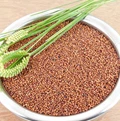
Researchers at the Penn State have come to an interesting conclusion: an abnormal accumulation of carbohydrates (starches and sugars) in leaves and kernels of a mutant line of corn can be traced to a single mis-regulated gene.
This discovery hints on how plants tackle stress.
These researchers had previously discovered the Maize ufo1 gene, which is responsible for producing the mutant line of corn. Now, the researchers are busy evaluating its effects and its potential to be included in creating new corn lines that are better adapted to thrive in a world that is warming constantly.
Their latest study is the discovery of higher levels of sugar in plant tissues. And this study is a thing to be considered by plant geneticists.
Surinder Chopra, Professor of Maize Genetics at the College of Agricultural Sciences, say, “this discovery has implications for food security and breeding new crop lines that can better deal with a changing climate — with corn, there is still a lot to be done. In fact, there is a great deal of genetic and phenotypic diversity in corn, and we can use that diversity and ask the question, ‘How is the ufo1 gene distributed in the existing 10,000 germplasm lines?'”
Chopra is trying to find an answer to the question:
Can plant geneticists incorporate ufo1 gene for enhancement of corn crop traits?
Chopra adds, “Certainly, stress tolerance, but also likely seed development, which has implications in seed yield as well as improved biomass. And we would like to develop a better plant type that could grow in more dense culture, yet still be more productive. And finally, we need to look at resiliency and sustainability. Can we breed corn lines that get the same amount of yield with lower fertilizer inputs and need less water?”

How it all started
Chopra had begun research on the Maize ufo1 gene, as it was linked to the red/orange pigmentation in the mutant line of corn.
The eminent maize geneticist, Charles Burnham of the University of Minnesota, had recognized this striking ufo1 gene in. Derek Styles, another eminent maize geneticist at the University of Victoria, Canada, then picked the name, which means "unstable factor for orange."
in 1997, Styles sent the seeds for the mutant line to Chopra. Since then, Chopra introgressed its genes in an inbred line, which is maintained by his research group. In 2019, Chopra was successful in solving the genetic mystery of ufo1 gene.
It is seen that the gene controls a number of plant characteristics and not limited to pigmentation. yet, ufo1 is a single gene and it does not function alone in the genome of corn. This was unearthed by Chopra's group of researchers.
Maize plant contains over 30,000 genes. It is vital to know the interaction of ufo1 gene with other genes before it can be used in breeding a new crop type.
Chopra said, "“In order to go to the breeding aspect, we first need to learn how this gene actually functions. We need to learn about how it partners with proteins, and learning about those protein interactions will be the goal of future research.”
The recent study done by researchers reveal how the absence or presence of ufo1 gene affects the accumulation of carbs or sugars in corn seed. This is as per a statement given by Debamalya Chatterjee, who is a doctoral student of agronomy and the one who spearheaded the research.
According to Chatterjee, “down the road, we could use this knowledge of the ufo1 gene in breeding, to perform better crosses that make more resilient and more productive hybrids, where sugars and starches are in balance."
About plant materials used in study
Plant materials used in the study were grown in the summer seasons of 2016-2000 at the plant growth chamber and greenhouse facilities at the University Park campus of the Penn State and at the Russell E. Larson Agricultural Research Center, Rock Springs. Researchers obtained genetic stocks and inbreds from the Maize Genetics Cooperation Stock Center, which is managed by the Agricultural Research Service of the USDA.











